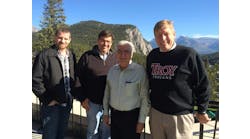Tragically, while capital moves at the speed of light, people, societies, families, towns, communities and infrastructure cannot. When the game leaves town, people are left twiddling their thumbs.” After reading your thoughtful editorial in the December (“Are You Ready for Process Control,” Dec. ’04, p11) I am moved to offer you a comment or two in support.
You began by lamenting that employment in the process control industry is threatened by advances in technology. Your conclusion, a reasonable one, is that the control engineering community are somewhat victims of their own success, and must build on that success by “shifting their viewpoints,” inevitably, from instrumentation systems to process control. This seems like safe advice to control engineers, but I wonder, does it truly address the problems of the professional whose job is threatened?
You are putting a brave face on an increasingly worrisome problem, that despite the great work being done by control system professionals, their services are in declining demand, as time goes on. There seems to be a much broader theme at issue here, one that must be understood by practioners of instrumentation technology. “Shifting viewpoints,” as you put it, are most definitely required, but, I offer, perhaps the change of focus should be for control professionals to elevate their gaze somewhat beyond the process plant to the macro business world.
Like you, I have been troubled by the work-world trends we are seeing. There is a tendency for us to think that because it is happening, it is, and was inevitable, and thus our lack of preparedness is our own fault. We are told as much by corporate leaders. However, as Michael Moore and others have tried to point out, the workers are actually unwitting casualties of what we commonly know as “globalization.” Within this global business framework, which we're reminded daily, is a natural and wholly irresistible evolution. Nations are instructed to concentrate on producing only those goods and services which they are uniquely positioned to provide at the lowest planetary cost. This is nothing more complicated than factory floor specialization transferred to a planet-wide venue. To the captains of industry, and their government sponsors, this makes sense because it's easy to understand and, with government complicity, just as easy to implement. To professionals and blue collar workers alike, it is vocational, societal and economic suicide.
Most importantly, so-called "free-trade,” or the legislated environment that enables globalization, is not, as we are constantly told, strictly about trade in goods and services. More precisely, it is about investment, and the unrestricted flow of capital. In this context, the acronym "NAFTA" appropriately stands for "Not A Free Trade Agreement.” Globalization is a game that is sponsored by nations and played almost exclusively by large corporations using people, wherever they may be, purely as pawns; discretionary and expendable foot soldiers in a high stakes game of monopoly. Unlike monopoly however, there are innumerable currencies which in turn have a variable value, just to provide an interesting sub-plot. Thus, the game itself becomes complicated, over-complicated in fact, almost on purpose, which keeps small players, like ordinary citizens, on the sidelines watching in awe. Tragically, while capital moves at the speed of light, people, societies, families, towns, communities and infrastructure cannot. When the game leaves town, people are left twiddling their thumbs.
People like Michael Moore, a true American hero in my opinion, likely understand better than most how this game is being played, and most importantly, that the rules are open to change. Our countries have gone to great lengths to negotiate a series of extremely complex and detailed trade agreements, which protect and encourage cross-border investment and trade. As such, there is nothing at all to stop them from negotiating terms that similarly protect individuals, families, cultures, values, history, broadcasting, immigration, education, security, or the environment. We do it inter-regionally, within our own countries, so really, there is no obstacle, just a lack of will, correct understanding followed by political action. Above all, we must get beyond the idea that efficiency and productivity are the "raison d'etre" of our societies. We must assert, as citizens, that economics is not our god, nor is technology, and that so-called "globalization" is entirely a human construct, changeable at our whim.
Unfortunately, within the context of globalization, it often doesn't actually matter how creative, versatile, productive and efficient an individual engineer or instrumentation technologist becomes. The industrial need they purport to satisfy may not be there. It may not, that is, unless professional engineers and technologists start using their smarts to modify the rules of the game that has, until now been played, with workers as passive, conforming and obedient pawns. Although I have said that Michael Moore is an American hero, his preoccupation with corporations as the villains of this piece is actually slightly misplaced.
Certainly, corporations are the obvious perpetrators of this economic holocaust, but they are doing what the rules of investment and global trade permit. That being the case, who makes the rules? In a democracy, supposedly, it is the people. In that case, individual citizens simply need to become informed and get actively involved. In this regard, control system professionals, with their unique gifts for analyzing and understanding complex phenomena are well suited to the challenge, if they but realize it and shake off their passivity. It is our collective passivity that is the true enemy; not corporations, not the Chinese, not politicians.
Latest from Home
Latest from Home
Leaders relevant to this article:



